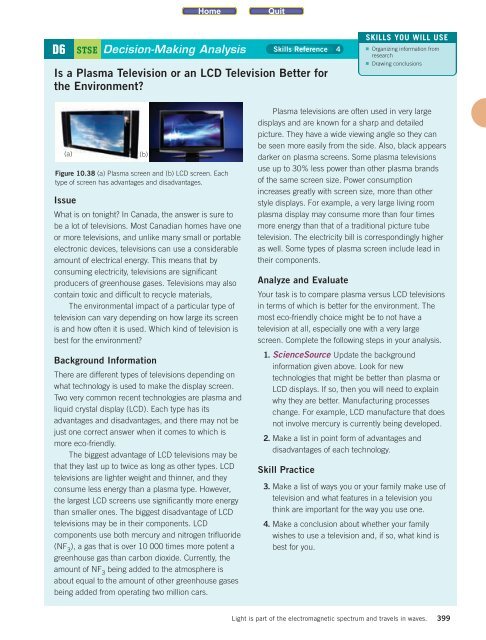is10_sb_unit_d
is10_sb_unit_d
is10_sb_unit_d
You also want an ePaper? Increase the reach of your titles
YUMPU automatically turns print PDFs into web optimized ePapers that Google loves.
D6 STSE Decision-Making Analysis Skills Reference 4<br />
Is a Plasma Television or an LCD Television Better for<br />
the Environment?<br />
(a) (b)<br />
Figure 10.38 (a) Plasma screen and (b) LCD screen. Each<br />
type of screen has advantages and disadvantages.<br />
Issue<br />
What is on tonight? In Canada, the answer is sure to<br />
be a lot of televisions. Most Canadian homes have one<br />
or more televisions, and unlike many small or portable<br />
electronic devices, televisions can use a considerable<br />
amount of electrical energy. This means that by<br />
consuming electricity, televisions are significant<br />
producers of greenhouse gases. Televisions may also<br />
contain toxic and difficult to recycle materials,<br />
The environmental impact of a particular type of<br />
television can vary depending on how large its screen<br />
is and how often it is used. Which kind of television is<br />
best for the environment?<br />
Background Information<br />
There are different types of televisions depending on<br />
what technology is used to make the display screen.<br />
Two very common recent technologies are plasma and<br />
liquid crystal display (LCD). Each type has its<br />
advantages and disadvantages, and there may not be<br />
just one correct answer when it comes to which is<br />
more eco-friendly.<br />
The biggest advantage of LCD televisions may be<br />
that they last up to twice as long as other types. LCD<br />
televisions are lighter weight and thinner, and they<br />
consume less energy than a plasma type. However,<br />
the largest LCD screens use significantly more energy<br />
than smaller ones. The biggest disadvantage of LCD<br />
televisions may be in their components. LCD<br />
components use both mercury and nitrogen trifluoride<br />
(NF3 ), a gas that is over 10 000 times more potent a<br />
greenhouse gas than carbon dioxide. Currently, the<br />
amount of NF3 being added to the atmosphere is<br />
about equal to the amount of other greenhouse gases<br />
being added from operating two million cars.<br />
Plasma televisions are often used in very large<br />
displays and are known for a sharp and detailed<br />
picture. They have a wide viewing angle so they can<br />
be seen more easily from the side. Also, black appears<br />
darker on plasma screens. Some plasma televisions<br />
use up to 30% less power than other plasma brands<br />
of the same screen size. Power consumption<br />
increases greatly with screen size, more than other<br />
style displays. For example, a very large living room<br />
plasma display may consume more than four times<br />
more energy than that of a traditional picture tube<br />
television. The electricity bill is correspondingly higher<br />
as well. Some types of plasma screen include lead in<br />
their components.<br />
Analyze and Evaluate<br />
Your task is to compare plasma versus LCD televisions<br />
in terms of which is better for the environment. The<br />
most eco-friendly choice might be to not have a<br />
television at all, especially one with a very large<br />
screen. Complete the following steps in your analysis.<br />
1. ScienceSource Update the background<br />
information given above. Look for new<br />
technologies that might be better than plasma or<br />
LCD displays. If so, then you will need to explain<br />
why they are better. Manufacturing processes<br />
change. For example, LCD manufacture that does<br />
not involve mercury is currently being developed.<br />
2. Make a list in point form of advantages and<br />
disadvantages of each technology.<br />
Skill Practice<br />
SKILLS YOU WILL USE<br />
■ Organizing information from<br />
research<br />
■ Drawing conclusions<br />
3. Make a list of ways you or your family make use of<br />
television and what features in a television you<br />
think are important for the way you use one.<br />
4. Make a conclusion about whether your family<br />
wishes to use a television and, if so, what kind is<br />
best for you.<br />
Light is part of the electromagnetic spectrum and travels in waves.<br />
399


